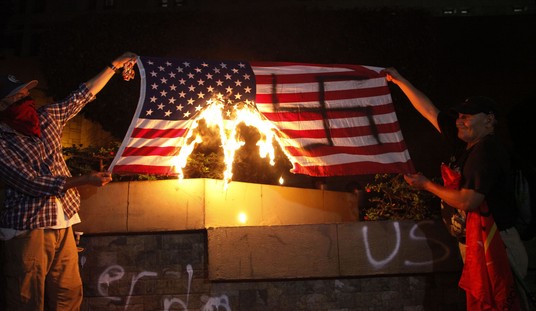I don’t remember much about my early years in Uganda, where I was born, except fear. I grew up under one of the most brutal dictatorships in recent African and world history - Idi Amin’s. At age 12, my life changed thanks to the sacrificial work of American missionaries. They taught us English. They taught us to read and to write. And they taught us The Bible and brought us Jesus. They also brought advancement to our country – and to Africa in general.
My friends and I loved America even after we learned about the transatlantic slave trade. And why not? First, we were too busy trying to survive. And we couldn’t ignore Africa’s complicity in that sad chapter of our history. All things considered, we Ugandans believed the descendants of our enslaved people who’d been shipped to the Americas had done well for themselves. They were, and are, the most well-off blacks in the world. Any of us would have gladly switched places with them.
America was also the biggest donor of foreign aid. Initially, the point was to offer a hand-up to Africa’s underdeveloped countries with clean water, medicines, and critical care to help our struggling communities. Without question, American aid saved millions of under-nourished children in our poor nations.
But there were problems, too. In too many instances, US-affiliated corporations offered funding or brokered loans for large government projects like dams, airports, hospitals, and roads from big multi-nationals like the World Bank. Although Africa desperately needed infrastructure development, the exorbitant interest rates and debt loads were often too heavy to bear. Consequently, our governments were forced to secure those deals with our enormous natural resources.
Predictably, we defaulted and the result was an unconscionable pillaging of Africa’s natural resources. Almost all developed countries were guilty of this practice – America, France, Russia, and Brazil among them. Today, China is raising the practice to a high art form. Indeed, many of us believe Africa’s current leaders - like the old kings and chiefs who governed us during the trans-Atlantic slave trade - are selling us once again.
Recommended
But today, there is an even more troubling trend on the rise – a form of cultural imperialism. Let me explain. The continent called Africa did not exist prior to the arrival of the Europeans. The landmass was populated by tribes like the Yoruba, Baganda, Maasai, and Tutsis: a people as different as the Irish and Japanese. Despite our differences, we shared common values that sustained our cultural history. Values like hard work, respect for elders, family, community, enduring wealth in childbearing, and integrity.
My tribe, the Baganda, has a 3,000-year traceable history. For most of that time, it was transmitted by listening to music and stories reminding us of who we were. Around eating spaces and fireplaces, we’d memorize timeless truths and learn values that spoke to our collective identity. One of our tribal proverbs says: If we stand tall, it’s because we stand on the shoulders of many ancestors.
But it’s 2025 and our fireplaces are dying. Our ancestors have been silenced, their wise sayings and tested knowledge drowned out by social media, bloggers, and pundits, all thanks to smart phones and global access to the internet. Our young population – 75 percent of which is below the age of 35 - has adopted new norms from the Western-driven global public square, which is itself undergoing a cataclysmic identity crisis.
Consider the gender dysphoria phenomenon. Twenty years ago, if anyone said that a man could become a woman by simply feeling like it, they’d call them crazy. Not recently. An American mother is not even allowed to try and understand why their 7-year-old boy feels like he’s a girl. Merely questioning it is transphobic. Indeed, she’s told by authorities she must affirm her son’s gender journey. Or else.
In Africa, transgenderism is perceived like every sensible person did only a few years ago: It’s a mental disorder that merits treatment similar to a thin person suffering anorexia who believes they’re overweight. We don’t affirm and encourage them not to eat!
The fact is, the global public square – dominated by America – has decided to debate biological and historic absolutes. I recently spoke to one African leader who exclaimed, “I can’t believe an American Supreme Court justice could not define what a woman is!” Clearly, this is not the same America that brought us Christianity.
My chief aim in saying these things is not to challenge or debate woke American values, postmodernism or what looks to us like nihilism. Rather, I say these things to sound the alarm concerning something more ominous.
A recent DOGE report revealed that USAID, America’s premier aid agency, had spent $5.5 million on LGBT activism in Uganda. My friends back home aren’t surprised. Our authorities have confiscated unauthorized American books depicting gay sex embedded in local public-school libraries. We’ve seen American men openly offering cash for sex to starving young boys on our streets. Some U.S-funded activists are advocating for gay parades with floats carrying men simulating sex on a continent where men and women don’t openly express affection, much less kiss in public.
Over the past decade, U.S tax dollars have been used to strong arm African countries to adopt American moral values in exchange for critical care and essential economic aid. Across Africa, our leaders are asking: Why is America forcing us to violate our norms? We thought the point of foreign aid is benevolence and charity, not the advancement of culture and ideology. Why do they wish to dictate how Africans should do family or sexuality?
Worse still, U.S agencies arrogantly assume that we lack the capacity to reason independently, and any debate is met with fierce opposition. Pushing back is tantamount to hate.
Curiously, America has been silent about the anti-gay policies of her Middle Eastern allies. Why is it that Islamic nations like Saudi Arabia, Qatar, and UAE do not have any such demands placed upon them? The U.S State Department hasn’t slapped travel advisories on Middle East countries like it has with Uganda. Why?
This inconsistent posturing and these discriminatory policies are damaging the face of American philanthropy. All the good that America has done on the continent is being sabotaged by these post modernistic globalists hellbent on cultural indoctrination and transformation. And using U.S. tax dollars to do it without taxpayer consent. Or congressional intent.
I am a proud Texan and married a white woman from Chicago whose parents escaped Ceausescu’s Communist regime in Romania. But I still maintain a close connection to Africa and my country of birth too, and this I know: Africans are not confused about what a man is. As the old African saying goes, when roosters begin to lay eggs simply because they think or feel like hens, then Africans can join the ponderings of their Western friends.
Until then, Africans will continue to refuse to capitulate to these current ideological trends and will reject the offensive Ameri-centric culture-lens that’s being imposed on them. They are Africans, after all, not Americans.
They are asking that everyone – both West and East –allow Africa to craft her own contemporary expression of the ancient collective value-system that has governed her people for millennia.
Dr. Dennis Sempebwa was born and raised in Uganda. He has served in 89 countries as an award-winning recording artist, leadership coach, educator, and a sought-after speaker. Holding numerous doctorate degrees and authorship of 18 books, Dennis has been dubbed one of Africa’s top thought-leaders and public intellectuals. He and his family reside in Texas, USA.

























Join the conversation as a VIP Member